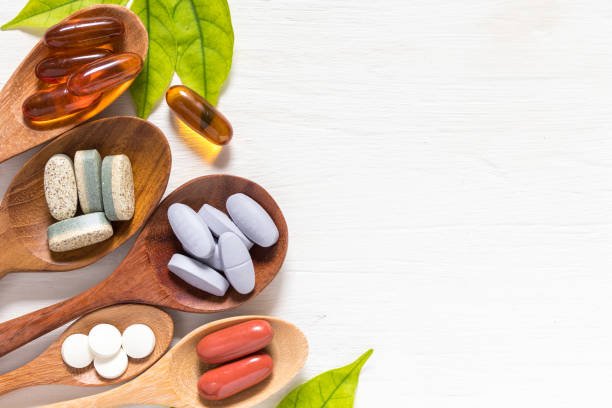Perimenopause is a transitional phase that leads to menopause, typically occurring in women between their early 40s and late 50s. During this period, hormonal fluctuations can cause various symptoms, including weight gain, particularly around the abdomen.
While diet and exercise play crucial roles in managing this weight gain, certain supplements can also be effective in supporting weight management during perimenopause.
This article explores the best supplements to help you combat perimenopause weight gain, focusing on those with evidence-backed benefits.
Understanding Perimenopause and Weight Gain
Before diving into the supplements, it’s essential to understand why weight gain is common during perimenopause.

Hormonal shifts, particularly the decrease in estrogen, play a significant role in how your body stores fat. Estrogen helps regulate metabolism and fat distribution, so its decline can lead to an increase in abdominal fat.
Recommended: Chinese Medicine For Menopause Weight Gain
Additionally, lower progesterone levels may cause water retention, while reduced testosterone can decrease muscle mass, further slowing metabolism.

Top 9 Supplements For Perimenopause Weight Gain
1. Omega-3 Fatty Acids
Omega-3 fatty acids, commonly found in fish oil, are well-known for their anti-inflammatory properties. However, they also play a vital role in weight management.
Omega-3s help improve insulin sensitivity, making it easier for your body to manage glucose levels and reduce fat storage.
Additionally, these fatty acids may boost metabolism by enhancing the function of cells that burn fat for energy.
Recommended: Can Taking Testosterone Supplement Make You Have Low Sperm Count?
Best Sources: Fatty fish like salmon, mackerel, and sardines are rich in omega-3s. If you’re not a fan of fish, consider a high-quality fish oil supplement or a vegan alternative like algae oil.
2. Calcium and Vitamin D
Calcium and vitamin D work together to support bone health, but they also have a significant impact on weight management during perimenopause.
Studies suggest that calcium can aid in fat breakdown, while vitamin D enhances calcium absorption and may help regulate the hormones that control appetite and fat storage.
Best Sources: Dairy products are excellent sources of calcium and vitamin D, but you can also find them in fortified foods, leafy greens, and supplements. A combined calcium and vitamin D supplement can ensure you’re getting enough of both nutrients.
Recommended: 10 Best Vitamins For Hormonal Acne
3. Magnesium
Magnesium is an essential mineral that plays a role in over 300 biochemical reactions in the body, including those related to metabolism and stress management.
During perimenopause, stress levels often increase, leading to elevated cortisol levels, which can contribute to weight gain. Magnesium helps regulate cortisol levels and improves insulin sensitivity, making it easier to maintain a healthy weight.
Best Sources: Dark leafy greens, nuts, seeds, and whole grains are rich in magnesium. Magnesium supplements, such as magnesium citrate or glycinate, are also effective.
4. B Vitamins
The B vitamins, particularly B6, B12, and folate, are crucial for energy production and metabolism. These vitamins help convert food into energy, making them essential for maintaining a healthy weight during perimenopause.
Additionally, they play a role in reducing fatigue, which can often lead to decreased physical activity and subsequent weight gain.
Recommended: Does Testosterone Replacement Cause Infertility?
Best Sources: B vitamins are found in whole grains, lean meats, eggs, and legumes. A B-complex supplement can provide a balanced dose of these essential vitamins.
5. Chromium
Chromium is a trace mineral that plays a key role in regulating blood sugar levels. Stable blood sugar is essential for preventing insulin spikes, which can lead to fat storage, especially in the abdominal area. By improving insulin sensitivity, chromium can help reduce sugar cravings and support healthy weight management.
Best Sources: Broccoli, green beans, and whole grains are good dietary sources of chromium. If you struggle to get enough from food, consider a chromium picolinate supplement.
6. Green Tea Extract
Green tea extract is rich in catechins, particularly epigallocatechin gallate (EGCG), which has been shown to boost metabolism and promote fat burning.
Green tea extract also contains caffeine, which can enhance the thermogenic effect, helping your body burn more calories throughout the day. This supplement is particularly beneficial for targeting stubborn belly fat during perimenopause.
Recommended: Can Taking Testosterone Make You Sterile?
Best Sources: Green tea is the most natural source of EGCG, but you can also find concentrated green tea extract supplements that provide a higher dose.
7. Probiotics
The gut microbiome plays a crucial role in weight management, and an imbalance in gut bacteria can lead to weight gain. Probiotics, which are beneficial bacteria, can help restore balance to the gut microbiome, improving digestion and reducing inflammation.
Certain strains of probiotics have been shown to aid in weight loss and prevent weight gain, making them a valuable supplement during perimenopause.
Best Sources: Fermented foods like yogurt, kefir, sauerkraut, and kimchi are rich in probiotics. You can also take a probiotic supplement with strains like Lactobacillus gasseri and Bifidobacterium breve for targeted benefits.
8. Black Cohosh
Black cohosh is a popular herbal supplement known for its ability to alleviate menopause symptoms, including hot flashes and mood swings. It may also help balance hormones during perimenopause, which can indirectly support weight management.
While more research is needed, some studies suggest that black cohosh can help reduce the risk of weight gain by modulating estrogen levels.
Recommended: Does Magnesium Affect Breast Milk Production?
Best Sources: Black cohosh is primarily available in supplement form, typically as a capsule or tincture.
9. Fiber Supplements
Dietary fiber is essential for weight management because it helps you feel full, reducing overall calorie intake. Fiber also supports healthy digestion and can help regulate blood sugar levels.
During perimenopause, when metabolism slows down, increasing fiber intake can be particularly beneficial.
Recommended: Top 6 Signs Of Poor Egg Quality You Should Know
Best Sources: Whole grains, fruits, vegetables, and legumes are high in fiber. If your diet is lacking, consider a fiber supplement like psyllium husk or glucomannan.

Considerations Before Starting Supplements
While supplements can support weight management during perimenopause, they should be used in conjunction with a balanced diet and regular exercise.
Recommended: Hair Fall After Pregnancy Home Remedy
It’s also important to consult with a healthcare provider before starting any new supplement regimen, especially if you have underlying health conditions or are taking other medications.
Conclusion
Managing weight during perimenopause can be challenging, but with the right approach, it is possible to maintain a healthy weight and feel your best. Incorporating these supplements into your daily routine, alongside a balanced diet and regular physical activity, can provide the support you need during this transitional phase.
Remember, each woman’s experience with perimenopause is unique, so it may take some trial and error to find the right combination of supplements that work best for you.
By taking a proactive approach to your health and well-being, you can navigate perimenopause with confidence and ease, minimizing weight gain and enhancing your overall quality of life.
